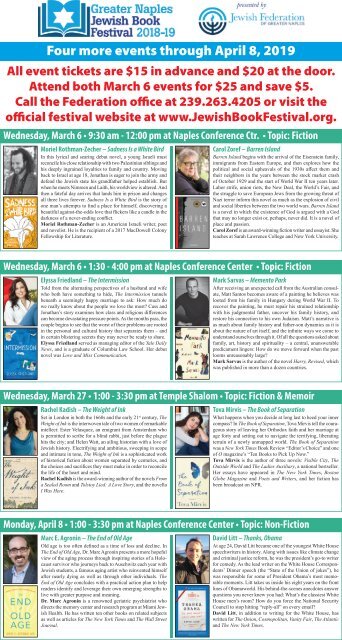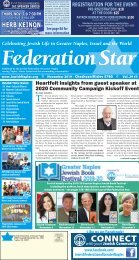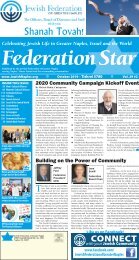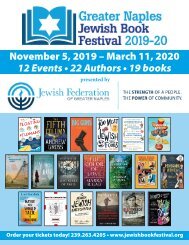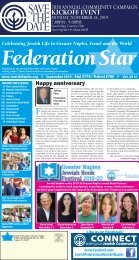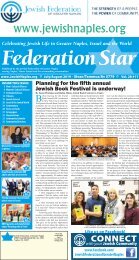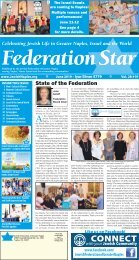Federation Star - March 2019
Monthly newspaper of the Jewish Federation of Greater Naples
Monthly newspaper of the Jewish Federation of Greater Naples
You also want an ePaper? Increase the reach of your titles
YUMPU automatically turns print PDFs into web optimized ePapers that Google loves.
P<br />
Four more events through April 8, <strong>2019</strong><br />
All event tickets are $15 in advance and $20 at the door.<br />
Attend both <strong>March</strong> 6 events for $25 and save $5.<br />
Call the <strong>Federation</strong> office at 239.263.4205 or visit the<br />
official festival website at www.JewishBookFestival.org.<br />
Wednesday, <strong>March</strong> 6 • 9:30 am - 12:00 pm at Naples Conference Ctr. • Topic: Fiction<br />
Moriel Rothman-Zecher – Sadness Is a White Bird<br />
In this lyrical and searing debut novel, a young Israeli must<br />
reconcile his close relationship with two Palestinian siblings and<br />
his deeply ingrained loyalties to family and country. Moving<br />
back to Israel at age 18, Jonathan is eager to join the army and<br />
defend the Jewish state his grandfather helped establish. But<br />
when he meets Nimreen and Laith, his worldview is altered. And<br />
then a fateful day arrives that lands him in prison and changes<br />
all three lives forever. Sadness Is a White Bird is the story of<br />
one man’s attempts to find a place for himself, discovering a<br />
beautiful against-the-odds love that flickers like a candle in the<br />
darkness of a never-ending conflict.<br />
Moriel Rothman-Zecher is an American Israeli writer, poet<br />
and novelist. He is the recipient of a 2017 MacDowell Colony<br />
Fellowship for Literature.<br />
Carol Zoref – Barren Island<br />
Barren Island begins with the arrival of the Eisenstein family,<br />
immigrants from Eastern Europe, and then explores how the<br />
political and social upheavals of the 1930s affect them and<br />
their neighbors in the years between the stock market crash<br />
of October 1929 and the start of World War II ten years later.<br />
Labor strife, union riots, the New Deal, the World’s Fair, and<br />
the struggle to save European Jews from the growing threat of<br />
Nazi terror inform this novel as much as the explosion of civil<br />
and social liberties between the two world wars. Barren Island<br />
is a novel in which the existence of God is argued with a God<br />
that may no longer exist or, perhaps, never did. It is a novel of<br />
place and passion.<br />
Carol Zoref is an award-winning fiction writer and essayist. She<br />
teaches at Sarah Lawrence College and New York University.<br />
Wednesday, <strong>March</strong> 6 • 1:30 - 4:00 pm at Naples Conference Center • Topic: Fiction<br />
Elyssa Friedland – The Intermission<br />
Told from the alternating perspectives of a husband and wife<br />
who both have something to hide, The Intermission tunnels<br />
beneath a seemingly happy marriage to ask: How much do<br />
we really know about the people we love the most? Cass and<br />
Jonathan’s story examines how class and religious differences<br />
can become devastating pressure points. As the months pass, the<br />
couple begins to see that the worst of their problems are rooted<br />
in the personal and cultural history that separates them – and<br />
in certain blistering secrets they may never be ready to share.<br />
Elyssa Friedland served as managing editor of the Yale Daily<br />
News, and is a graduate of Columbia Law School. Her debut<br />
novel was Love and Miss Communication.<br />
Mark Sarvas – Memento Park<br />
After receiving an unexpected call from the Australian consulate,<br />
Matt Santos becomes aware of a painting he believes was<br />
looted from his family in Hungary during World War II. To<br />
recover the painting, he must repair his strained relationship<br />
with his judgmental father, uncover his family history, and<br />
restore his connection to his own Judaism. Matt’s narrative is<br />
as much about family history and father-son dynamics as it is<br />
about the nature of art itself, and the infinite ways we come to<br />
understand ourselves through it. Of all the questions asked about<br />
family, art, history and spirituality – a central, unanswerable<br />
predicament lingers: How do we move forward when the past<br />
looms unreasonably large?<br />
Mark Sarvas is the author of the novel Harry, Revised, which<br />
was published in more than a dozen countries.<br />
a<br />
B<br />
Co<br />
a<br />
b<br />
p<br />
E<br />
t<br />
t<br />
i<br />
t<br />
D<br />
M<br />
b<br />
o<br />
m<br />
B<br />
F<br />
a<br />
w<br />
r<br />
p<br />
C<br />
Wednesday, <strong>March</strong> 27 • 1:00 - 3:30 pm at Temple Shalom • Topic: Fiction & Memoir<br />
Rachel Kadish – The Weight of Ink<br />
Set in London in both the 1660s and the early 21 st century, The<br />
Weight of Ink is the interwoven tale of two women of remarkable<br />
intellect: Ester Velasquez, an emigrant from Amsterdam who<br />
is permitted to scribe for a blind rabbi, just before the plague<br />
hits the city; and Helen Watt, an ailing historian with a love of<br />
Jewish history. Electrifying and ambitious, sweeping in scope<br />
and intimate in tone, The Weight of Ink is a sophisticated work<br />
of historical fiction about women separated by centuries, and<br />
the choices and sacrifices they must make in order to reconcile<br />
the life of the heart and mind.<br />
Rachel Kadish is the award-winning author of the novels From<br />
a Sealed Room and Tolstoy Lied: A Love Story, and the novella<br />
I Was Here.<br />
Tova Mirvis – The Book of Separation<br />
What happens when you decide at long last to heed your inner<br />
compass? In The Book of Separation, Tova Mirvis tell the courageous<br />
story of leaving her Orthodox faith and her marriage at<br />
age forty and setting out to navigate the terrifying, liberating<br />
terrain of a newly unmapped world. The Book of Separation<br />
was a New York Times Book Review “Editor’s Choice” and one<br />
of O magazine’s “Ten Books to Pick Up Now.”<br />
Tova Mirvis is the author of three novels: Visible City, The<br />
Outside World and The Ladies Auxiliary, a national bestseller.<br />
Her essays have appeared in The New York Times, Boston<br />
Globe Magazine and Poets and Writers, and her fiction has<br />
been broadcast on NPR.<br />
Monday, April 8 • 1:00 - 3:30 pm at Naples Conference Center • Topic: Non-Fiction<br />
Marc E. Agronin – The End of Old Age<br />
Old age is too often defined as a time of loss and decline. In<br />
The End of Old Age, Dr. Marc Agronin presents a more hopeful<br />
view of the aging process through inspiring stories of a Holocaust<br />
survivor who journeys back to Auschwitz each year with<br />
Jewish students, a famous aging artist who reinvented himself<br />
after nearly dying as well as through other individuals. The<br />
End of Old Age concludes with a practical action plan to help<br />
readers identify and leverage their own emerging strengths to<br />
live with greater purpose and meaning.<br />
Dr. Marc Agronin is a renowned geriatric psychiatrist who<br />
directs the memory center and research program at Miami Jewish<br />
Health. He has written ten other books on related subjects<br />
as well as articles for The New York Times and The Wall Street<br />
Journal.<br />
David Litt – Thanks, Obama<br />
At age 24, David Litt became one of the youngest White House<br />
speechwriters in history. Along with issues like climate change<br />
and criminal justice reform, he was the president’s go-to writer<br />
for comedy. As the lead writer on the White House Correspondents’<br />
Dinner speech (the “State of the Union of jokes”), he<br />
was responsible for some of President Obama’s most memorable<br />
moments. Litt takes us inside his eight years on the front<br />
lines of Obamaworld. His behind-the-scenes anecdotes answer<br />
questions you never knew you had: What’s the classiest White<br />
House men’s room? How do you force the National Security<br />
Council to stop hitting “reply-all” on every email?<br />
David Litt, in addition to writing for the White House, has<br />
written for The Onion, Cosmopolitan, Vanity Fair, The Atlantic<br />
and The New York Times.


